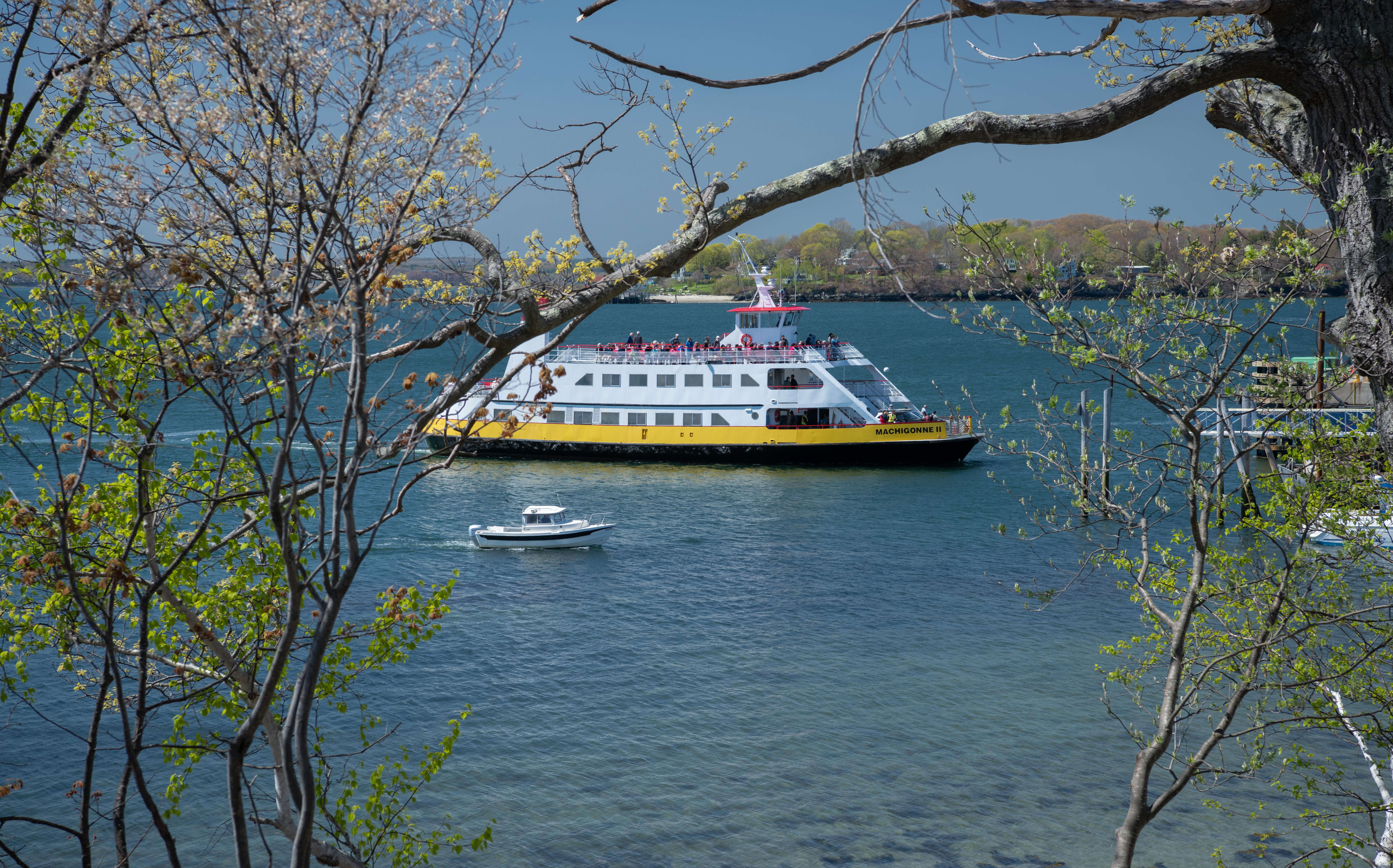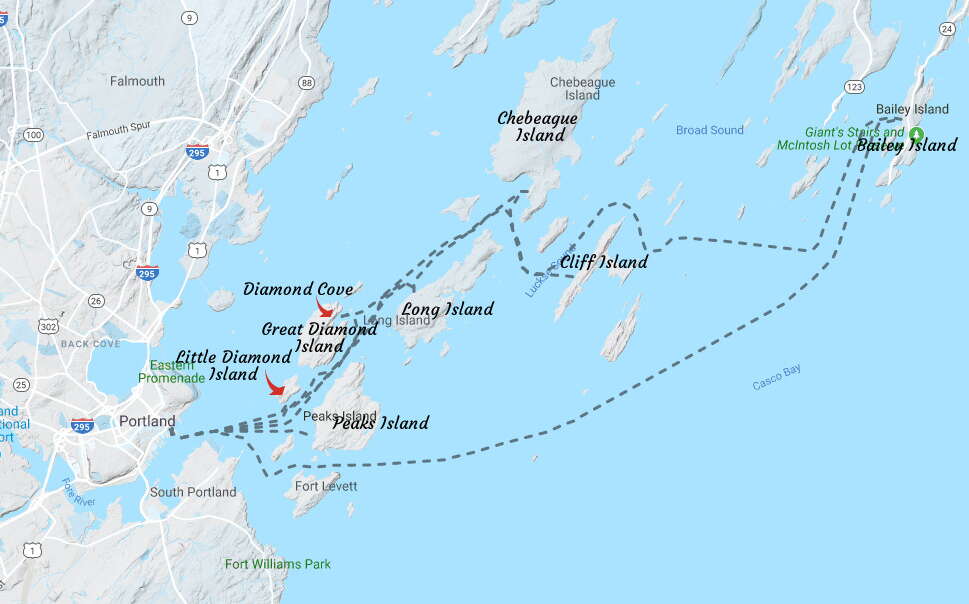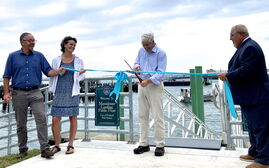
Processing Your Payment
Please do not leave this page until complete. This can take a few moments.
In the works for 6 years, new Casco Bay ferry is now months behind schedule
 Rendering / Courtesy, Casco Bay Lines
The future 599-passenger, 164-foot MV Battery Steele, shown here in a rendering, won't be delivered to Portland until November or December.
Rendering / Courtesy, Casco Bay Lines
The future 599-passenger, 164-foot MV Battery Steele, shown here in a rendering, won't be delivered to Portland until November or December.
A $22.8 million, eco-friendly Casco Bay Lines ferryboat, almost finished construction in Rhode Island after six years of development, will be docking later than expected at Peaks Island and on the Portland waterfront.
The 164-foot hybrid-power vessel was originally due to join the public ferry fleet next month. But now the boat won't be ready until November or December, according to Nick Mavodones, interim general manager and operations manager of Casco Bay Lines.
The hold-up began when a contractor decided to stop making batteries. Spear Power Systems, a subsidiary of Massachusetts-based Sensata Technologies (NYSE: ST), announced last summer it was winding down its marine battery business.
"So we had to take a step back and say, 'What do we do?'" Mavodones told Mainebiz.
That was no small question.
A 900-kilowatt-hour battery bank from Spear was expected to provide most of the power to propel the new ferry, with backup from two diesel generators and recharging from a station on the mainland.
And after all, the boat is dubbed the Battery Steele — the name of a historic former military fort on Peaks Island, but also a nod to the vessel's primary energy source.
The watergoing Battery Steele, with room for 599 passengers and 15 vehicles, will replace another Casco Bay Lines passenger-car ferry, the Machigonne II, on its 12-minute shuttles between Peaks and the Maine State Pier. The current vessel is smaller and, at age 37, well beyond its useful lifespan.
Casco Bay Lines says the Battery Steele will prevent emissions of up to 800 metric tons of carbon dioxide annually. It will also be one of the first public passenger ferries in the U.S. to utilize the hybrid technology.
Ripple effect
The contractor's exit last year has created a wave of other changes in the ferry project.
First, the new batteries. Casco Bay Lines considered several suppliers in consultation with the ferry's propulsion system contractor, Swiss manufacturer ABB, and the shipyard, Senesco Marine of North Kingstown, R.I.
A Norwegian company, Corvus Energy, won the bid and pledged to meet the original timeframe. But then the propulsion system had to be re-engineered, Mavodones said.
The original batteries were to be air-cooled; the new ones are water-cooled. Plus, they come in a different size, so equipment and racks holding the batteries had to be modified.
"As the propulsion systems integrator for the Casco Bay Lines hybrid double-ended ferry project currently under construction at Senesco Marine, we understand the importance of this project to the community," ABB said in a statement to Mainebiz.
"ABB quickly identified a new supplier, and the batteries have since been delivered to Senesco Marine. Due to the new battery supplier, some redesign of onboard vessel systems was needed."
The onshore charger is also running late. Originally to be delivered later this month or in early June, the unit has been delayed by material supply problems and probably won't be installed until September, according to Casco Bay Lines.
Because federal funds are paying most of the vessel's price tag, Casco Bay Lines has also had to make sure Corvus meets Federal Transit Administration "buy American" requirements. (It does — the company opened a plant last year in Bellingham, Wash.)

Then there are the safety regulation approvals required by the U.S. Coast Guard. It's relatively new to the lithium-ion battery technology and is keeping a close eye on battery-powered commercial vessels in development.
Because of the changes, Mavodones explained, "Engineers had to go back, re-evaluate everything, resubmit to the Coast Guard, and the resubmittal delayed other things. It stopped all the other submittals in their tracks."
Late last year, Casco Bay Lines pushed back the estimated date for the Battery Steele's completion to August 2024, according to project reports. Last month, the date was pushed back again, to November.
Casco Bay Lines won't have to shell out more money because of the later delivery, Mavodones emphasized. ABB and Spear are picking up additional expenses related to the battery switch.
"Delays aren't unusual," Mavodones said, "but the unique thing with these batteries is that they required a fair amount of re-engineering and submittals ... Sometimes when there's a delay the work can actually be done later and not affect the ultimate delivery of a boat. But this actually caused a delay in the final date.
"This is a relatively new technology in the United States, and it's a learning curve for us. There are a few hiccups here and there."
Long time coming
While it may arrive in Portland before Christmas, the Battery Steele won't be a holiday gift for passengers. Casco Bay Lines will need another six to eight weeks to get crew members oriented and trained on the new vessel.
The ferry service, operated by the quasi-public Casco Bay Island Transit District, carries over 1 million passengers, 35,000 vehicles and thousands of tons of freight annually. The fleet of five vessels connects six islands and Portland's working waterfront, and operates 365 days a year. Crews need to be able to serve on any boat at any time.

"Our employees need to understand fully how the boat works, including what button to push [to charge the batteries]," Mavodones continued. "We need to get everybody up to speed."
By the time the Battery Steele is in operation, seven years will have passed since Casco Bay Lines put the design of the vessel out to bid and eventually chose a Seattle firm, Elliott Bay Design Group.
Since then the design has evolved through a series of public meetings, the work of a vessel advisory committee and other input.
Some Peaks residents had worried that a boat larger than the Machigonne II would result in larger crowds of summer visitors, who would leave more trash and overwhelm the 760-acre island’s streets, parking and public restrooms.
“What’s happening is dangerous for the island,” said resident Lisa Penalver in a media interview at the time. “It’s the equivalent of running a superhighway through our community.”
But Casco Bay Lines has maintained that the size of the Battery Steele is simply a response to growing demand for ferry service. These days, there seems to be less outcry about how big the boat is — the question is, how soon will it arrive?
Mavodones thinks it will be worth the wait, and that passengers will appreciate the environmental benefits and how quiet the Battery Steele is when running on battery power.
"We're excited to be helping to pave the way in the country with this green technology and with this boat," he said. "It will be a delight to see it sailing into Portland Harbor."














0 Comments